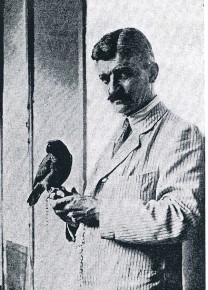Theodor Koch-Grünberg was born in Grünberg in 1872, being the son of the local evangelic pastor. He finished school in 1890.
Koch-Grünberg studied Philology both in Gießen and Tübingen and graduated in 1896. He eventually took up a position as a teacher and did private research on indigenous american people.
In 1898/99 he participated in an expedition to Brazil, which was guided by Hermann Meyer. After his return to Germany, Koch-Grünberg continued to work as a teacher.
In 1901 Koch-Grünberg took up an unpaid voluntary position at the Department for South America at the Ethnological Museum (formerly: Staatliches Museum für Völkerkunde) in Berlin. Moreover, he completed his dissertation thesis in 1902.
Throughout the following years Koch-Grünberg held an assistant position at the Ethnological Museum (formerly: Staatliches Museum für Völkerkunde) in Berlin. His museum work was only interrupted by several further expeditions: Between 1903 and 1905 he did his second journey to Brazil and also travelled to Colombia.
In 1909 Koch-Grünberg took up a position at the University in Freiburg. From 1911 until 1913 he undertook his third expedition to South America, this time doing research in the regions of Roroima and Orinoco.
After his return to Freiburg Koch-Grünberg took up a professorship for Anthropology at the university in Freiburg. Only two years later he became head chairman of the State Museum for Ethnology (Linden-Museum) in Stuttgart. Moreover, he began lecturing at the university in Heidelberg.
In 1924 Koch-Grünberg prepared for his fourth expedition to Brazil, but died of Malaria after arriving in Vista Allegre.
(Text written by Vincenz Kokot in March 2012; based on BAA Prof. Riese)
Short Portrait: Theodor Koch-Grünberg

Theodor Koch-Grünberg
 further information
further information
 Links
Links
